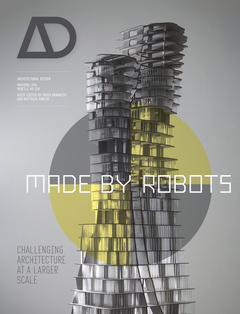Description
Made by Robots
Challenging Architecture at a Larger Scale
Architectural Design Series
Coordinators: Gramazio Fabio, Kohler Matthias
Language: English
Subject for Made by Robots:
Keywords
decade; next; robotics; adoption; widespread; techniques; industry; become; construction; manual labour; greater; efficiencies; effectiveness; practice; afford; operational; beyond; architecture; explicitly; nonstandard; serial; elements
136 p. · 21.1x27.7 cm · Paperback
Description
/li>Contents
/li>Biography
/li>
Although highly ambitious and sophisticated, most attempts at using robotic processes in architecture remain the exception; little more than prototypes or even failures at a larger scale. This is because the general approach is either to automate existing manual processes or the complete construction process. However, the real potential of robots remains unexploited if used merely for the execution of highly repetitive mass-fabrication processes: their capability for serial production of non-standard elements as well as for varied construction processes is mostly wasted. In order to scale up and advance the application of robotics, for both prefabrication and on-site construction, there needs to be an understanding of the different capabilities, and these should be considered right from the start of the design and planning process. This issue of AD showcases the findings of the Architecture and Digital Fabrication research module at the ETH Zurich Future Cities Laboratory in Singapore, directed by Fabio Gramazio and Matthias Kohler, which explores the possibilities of robotic construction processes for architecture and their large-scale application to the design and construction of high-rise buildings. Together with other contributors, they also look at the far-reaching transformations starting to occur within automated fabrication: in terms of liberation of labour, entrepreneurship, the changing shape of building sites, in-situ fabrication and, most significantly, design.
Contributors: Thomas Bock, Jelle Feringa, Philippe Morel, Neri Oxman, Antoine Picon and François Roche.
ETH Zurich contributors: Michael Budig, Norman Hack, Willi Lauer and Jason Lim and Raffael Petrovic (Future Cities Laboratory), Volker Helm, Silke Langenberg and Jan Willmann.
Featured entrepreneurs: Greyshed, Machineous, Odico Formwork Robotics, RoboFold and ROB Technologies.
5 EDITORIAL
Helen Castle
6 ABOUT THE GUEST-EDITORS
Fabio Gramazio and Matthias Kohler
8 SPOTLIGHT
Visual highlights of the issue
14 INTRODUCTION
Authoring Robotic Processes
Fabio Gramazio, Matthias Kohler and Jan Willmann
22 Integrating Robotic Fabrication in the Design Process
Michael Budig, Jason Lim and Raffael Petrovic
44 Mesh-Mould: Robotically Fabricated Spatial Meshes as Reinforced Concrete Formwork
Norman Hack and Willi Viktor Lauer
54 Robots and Architecture: Experiments, Fiction, Epistemology
Antoine Picon
60 Entrepreneurship in Architectural Robotics: The Simultaneity of Craft, Economics and Design
Jelle Feringa
66 Odico Formwork Robotics
Asbjørn Søndergaard
68 RoboFold and Robots.IO
Gregory Epps
70 Machineous
Andreas Froech
72 ROB Technologies
Tobias Bonwetsch and Ralph Bärtschi
74 GREYSHED
Ryan Luke Johns
76 Computation or Revolution
Philippe Morel
88 Changing Building Sites: Industrialisation and Automation of the Building Process
Thomas Bock and Silke Langenberg
100 In-Situ Fabrication: Mobile Robotic Units on Construction Sites
Volker Helm
108 Towards Robotic Swarm Printing
Neri Oxman, Jorge Duro-Royo, Steven Keating, Ben Peters, Elizabeth Tsai
116 Machines for Rent: Experiments by New-Territories
François Roche and Camille Lacadée
126 COUNTERPOINT
Crisis! What Crisis? Retooling for Mass Markets in the 21st Century
Tom Verebes
134 CONTRIBUTORS
Fabio Gramazio and Matthias Kohler are architects with multi-disciplinary interests, ranging from computational design and robotic fabrication to material innovation. In 2000, they founded the architectural office Gramazio & Kohler in Zurich, where numerous award-winning designs have been realized, integrating novel architectural design into a contemporary building culture. Trained at the Swiss Federal Institute of Technology ETH Zurich, their integral approach to practice and research focuses on the interplay of digital design and material processes through advanced construction methodologies. Since 2005, Gramazio & Kohler have held the Chair for Architecture and Digital Fabrication at the Swiss Federal Institute of Technology ETH Zurich, where they have founded the world’s first architectural robotic laboratory. The pioneering investigations concentrate on non-standardised architectural design and additive fabrication processes through the customised use of industrial robots.




